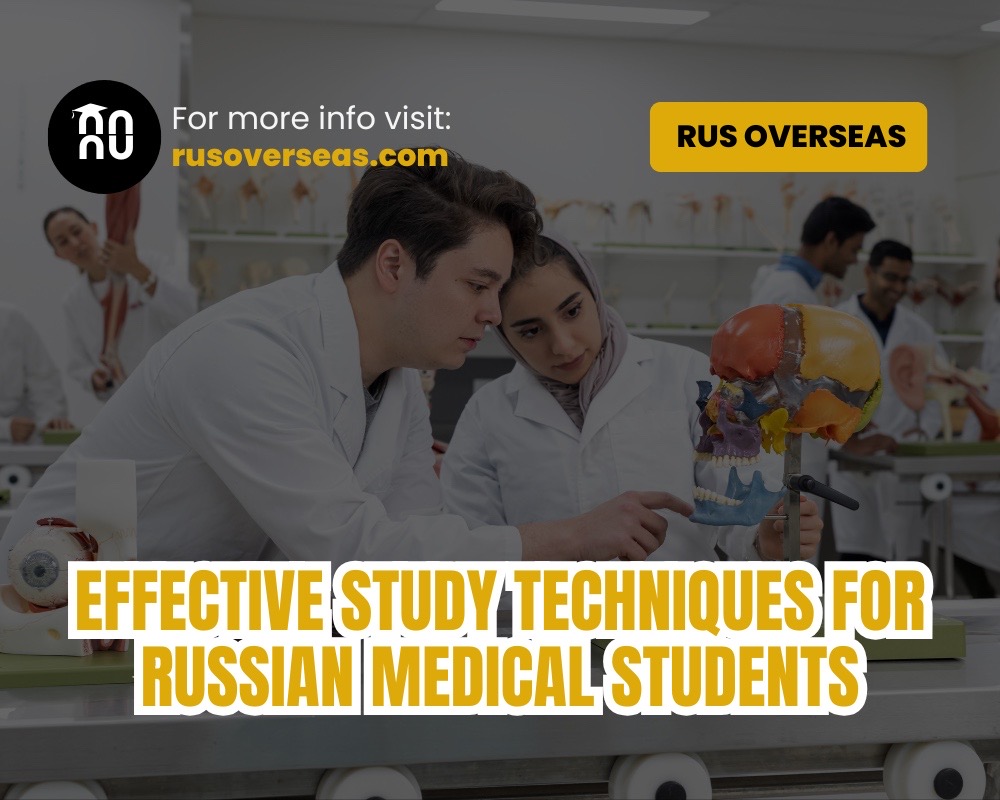Effective Study Techniques for Russian Medical Students.

Okay, so you're embarking on medical school in Russia. That's tough stuff! You've probably heard that it's difficult, and it is, but you don't have to undertake it alone. Let's talk about smart study tactics that will really help you conquer this behemoth of a curriculum and not just get by, but thrive.
The Russian Med School Reality Check:
First things first: the Russian medical school curriculum ain't no cakewalk. They actually beat up on the basic sciences, then throw you in at the deep end with clinical rotations. It's not a question of memorizing information; they want you to understand how it all works together. So cramming won't cut it.
Study Smarter, Not Harder: Techniques That Work
Here's the trick: you're going to want strategies that move beyond mere reading and rereading. Following are some proven methods that really work:
• Test Yourself, Seriously: Instead of reading your notes passively, proactively try to recall the information. Use flashcards, quiz yourself out loud, or even try to teach concepts to someone else. The act of retrieving information from your brain consolidates your memory and allows you to know what you don't know.
• Spaced Repetition: Defeating the Forgetting Curve: Train yourself to go over your material at increasing longer periods. Look over it soon after your lecture, then shortly afterwards, then after a week, and onwards. This works fantastically well at fighting against that natural ability to forget stuff and will effectively make that info stick. Even get apps like Anki to help you.
• Mix It Up (Interleaving): Don't spend hours working on one topic. Switch back and forth between topics. This will help you to be better able to keep different ideas separated and will help long-term memory.
• Connect the Dots (Elaboration): Try to connect new information to what you already know. Make analogies, create diagrams, anything that will make sense to you. The more you connect new information to what you already know, the more clear it will be.
• Visualize (Concept Mapping): Mind map or diagram. Structures information and how things are related. Especially useful for subject areas such as anatomy.
• Practice Questions Are Your Friend: Do plenty of practice questions and past papers. It's like dress rehearsal for exams – it shows you what you know, and what you need to practice some more. Take note of why the right answer is right, and not mere memorization.
• Plan Your Time (Seriously): Make a study schedule. Break down big tasks into little ones. Time-blocking can actually keep you on track.
• Take Good Notes (and Review Them!): Find a note-taking system that works for you. Use abbreviations, diagrams, whatever works for you to get down the main points. Then, review your notes regularly.
• Study Groups: Power in Numbers: It really helps to work with other people. Teach concepts to one another, test one another, and assist one another.
Specific Tips for the Russian Experience:
• Language is Key: If you're taking classes in Russian, you'll need to study diligently to master the language. Even if your classes are in English, studying some Russian will make clinical rotations and patient communication much simpler.
• Use Local Resources: Utilize libraries, online resources, and study groups in Russia.
• Be Adaptable: Russian pedagogy will differ from that to which you're used, so be flexible and adjust your strategies as such.
Self-Care Isn't Optional:
This is huge. Medical school is stressful. Sleep plenty, eat well, exercise, and learn to manage stress. Burnout is real, so make time for things that make you happy outside of studying.
The Bottom Line
Russian med school is not easy, but you'll manage. It won't kill you to use some good study habits and take care of yourself, and that way you'll even make it. Break a leg!
SIMPLE ADMISSION PROCESS
No hefty donations, no entrance exams, no hassle for documentation just your dream MBBS study and you. RUS OVERSEAS does everything for you from scratch. We make sure you don’t have to do rounds of rotation and get fed up with the process of admission. From beginning to end, we are with you.
THE PROCESS
Eligibility:
- 50% in PCB (40% for SC/ST/OBC) in Class 12.
- Minimum 17 years by December 31 of the admission year.
- NEET Qualification: Mandatory for Indian students.
Invitation letter:
After RUS OVERSEAS submits your documents in the university. The university issues you an invitation letter.
Visa process:
Once the invitation letter arrives. The company will start your visa processing and in a few days you will be on the plane to Russia.
HOW RUS OVERSEAS HELPS YOU IN YOUR JOURNEY
RUS OVERSEAS has the experience of more than a decade. Our team is supportive and cares for the students wholeheartedly. We are available 24/7. Your one stop solution for MBBS abroad is us. We at RUS OVERSEAS will never disappoint any student or parent in their fulfilling journey with us.
CONTACT US
Phone: +91 9560533703
Email: info@rusoverseas.com
Rus Overseas provides expert assistance in choosing the right program, application processing, visa support, and settling in Russia. Contact us today to begin your abroad journey in Russia!
Sakib Hasan

